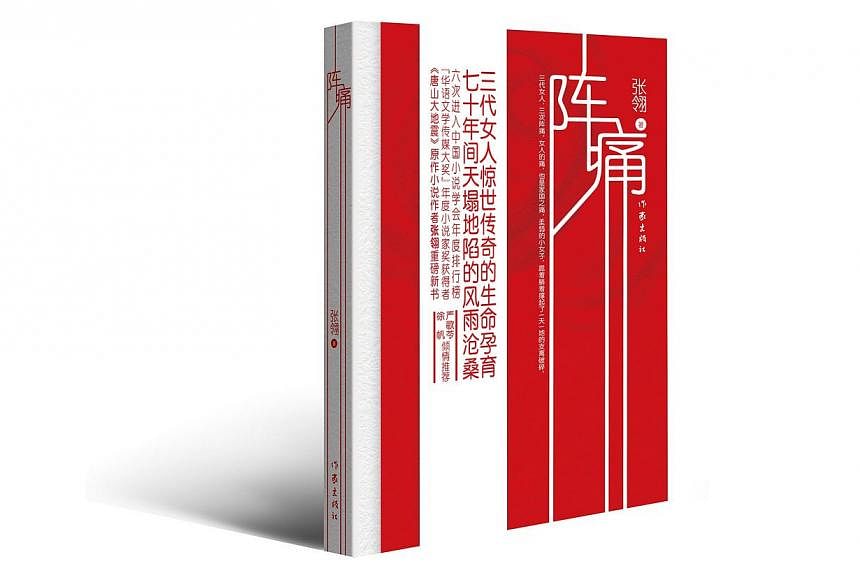To birth her latest book, Contractions, Chinese author Zhang Ling spent some time in a maternity hospital.
The book, published in Chinese in March, follows the lives of different generations of women, from the 1940s into the millennium, and explores their roles as women, wives and mothers.
Three key characters experience difficult labours and Zhang, 57, who is married but without a child, spent some time observing women in labour to gain intimate knowledge of the subject.
Although she has never experienced the pains of childbirth and childrearing personally, these matters remain close to her heart and mind, having defined the lives of least three generations of women in her family.
Zhang is the author of no fewer than 10 Chinese books, including the bestseller Aftershock, about the 1976 earthquake in China's Tangshan. The book was adapted into an award-winning movie in 2010 by famed film-maker Feng Xiaogang.
Her book, Gold Mountain Blues, about the journey of five generations of a Chinese family to Canada, is another popular read and it has been translated into English.
She will be speaking at three events next month at the Singapore Writers Festival.
In an e-mail interview with Life!, the Toronto-based Zhang says the inspiration for Contractions came from the women in her mother's family. Her maternal grandmother gave birth to 11 children; 10 survived and six are daughters.
Zhang says in Mandarin: "The difference in age between my mother, who is the eldest, and my youngest aunt is about 20 years. This means that for almost all the years my grandmother was fertile as a woman, her womb and breasts were never left alone."
The travails of war and famine added to the challenges of raising a brood of children. Those pains were replayed in the lives of her aunts.
She recalls a vivid instance of how one of them gave birth in 1967 during the Cultural Revolution in China, when an armed riot raged in the family's home in Wenzhou city in Zhejiang province and intense street fights had forced the hospital to close. "My aunt had to deliver at home and we had no medical equipment, just a pair of scissors, a bottle of iodine and some gauze," she says.
She is quick to point out that Contractions is not about the real life stories of women in her family, but there are "shades" of them in the book.
This is not the first time that the protagonists in her novel are female. Aftershock, for example, revolves around a mother's decision to save her son instead of daughter from the earthquake. But before Contractions, Zhang says she was not consciously exploring issues of femininity.
The change came as she dwelt on the lives of women throughout Chinese history. "In tumultuous times, men were often absent from their families for various reasons. As a result, the women became pillars of their families and for them to survive and raise their families, they had to be tenacious and courageous," she says.
A woman's strength under pressure also resonates with her. "I admire women who are independent, who are not afraid to love and hate... they are not warriors but when the sky collapses, you can be sure they are survivors."
Her own life has been one of daring and determination. She grew up during the Cultural Revolution and quit school at 16 to avoid being sent to a rural re-education camp. In 1979, she resumed her studies, pursuing English literature at Fudan University in Shanghai. After working as an English translator for the Ministry of Coal Industry for some years, she moved to Canada in 1986 to pursue a master's degree in English; her dream was to be a writer.
But with bills to pay, she decided to train and work as an audiologist. The daily grind kept her from writing until 1996, when she began to pen her first novel, Looking Into The Moon. In 2010, she became a full-time writer.
In a 2011 interview with monthly magazine Toronto Life, she said she and her husband, who works in real estate and whom she married when she was 37, chose not to have children as "being a mother would interfere" with her dream.
She is now busy writing another Chinese novel about "labour, courage, pursuit and disillusionment".
On choosing to write in Chinese instead of English, she says: "I received seven years of formal education in English and my foundation in the language is not bad. I can probably write a story that flows smoothly in English, but it would not be with the wanton rampage and absolute freedom that I feel writing in my mother tongue."



